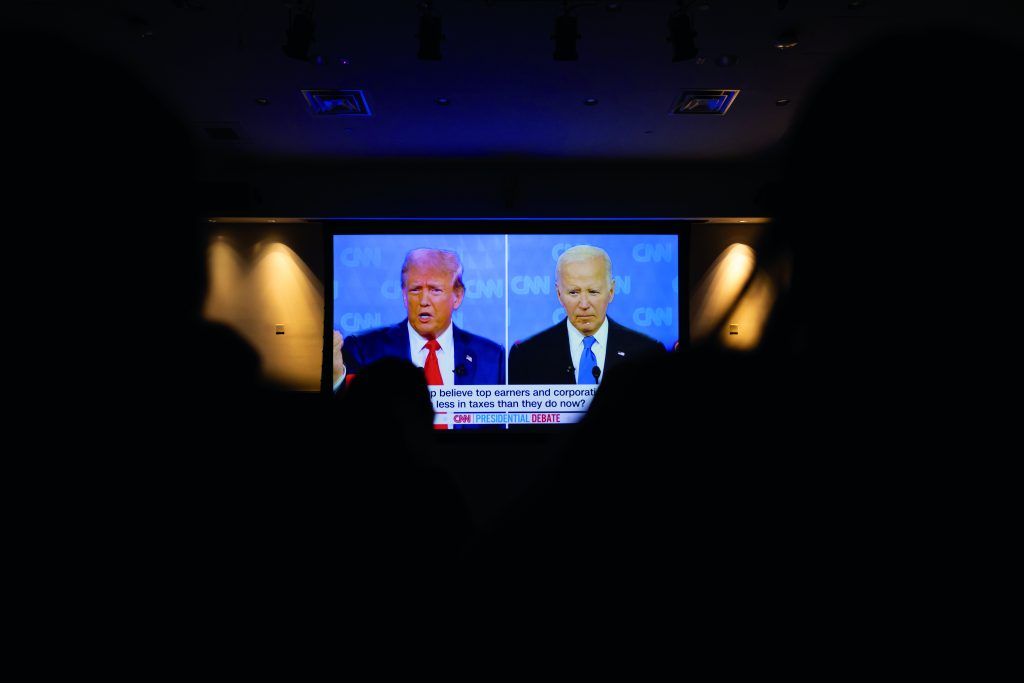Will Gen Z tune in or tune out?
By Dylan Poliakoff
Nova Southeastern University School/Montage
Although presidential debates usually attract millions of viewers, the youngest generation of voters do not seem to find presidential debates – including the recent 90-minute debate between President Joe Biden and former President Donald Trump – appealing.

Of the 51.3 million viewers who tuned in June 27 on live TV, only 3.9 million were between the ages of 18 and 34, according to a recent Axios report.
“With Gen Z’s shortened attention spans, it’s hard to get them to watch the full debate,” said Patrick Waldinger, co-director of debate at the University of Miami.
“I usually do not watch,” said Emma Navarro, a senior at Gulliver Prep in Pinecrest who was traveling during the debate and chose not to tune in. “I’d be more interested in politics if it felt more connected to my everyday life and if politicians spoke directly to young people about issues we care about.”
Following the June debate, Montage staffers conducted an online survey of 152 South Florida first-time and upcoming voters, ages 16-28. Although 65% say they had an interest in watching the debate, nearly 92% admit that they tuned out because of the debate format and the topics covered.
“With Gen Z’s shortened attention spans, it’s hard to get them to watch the full debate.”
Patrick Waldinger, Co-Director of debate at the University of Miami
Waldinger suggests that the debate format include a social media element to attract young and first-time voters. A recent study by S&P Global, which provides market data to governments, businesses and individuals, finds that 77% of Gen Zers get their news from social media. Waldinger said presidential candidates should learn from this statistic and use social media in debates, even allowing Gen Zers to ask debate questions.
“I think social media could be a good way to advertise for debates and gain the attention and interest in younger generations,” said Julie Hartigan, a senior at Palmer Trinity High School in Palmetto Bay. “It would allow the debate to be more personalized, which could be more appealing.”
Presidential debates have a long history in U.S. politics beginning with “The Lincoln-Douglas Debates of 1858,” when Abraham Lincoln and Frederick Douglas used debates to sway public opinion. The first televised debate occurred in 1960, when a charismatic John F. Kennedy faced Richard Nixon. Although Nixon was the incumbent vice president, many said that seeing these candidates de- bate impacted the election outcome, which was decided by only 112,827 votes.
The recent debate not only had a low turnout of young voters but of all voters, suggesting that young voters are not the only ones tuning out. The first presidential debate between Hillary Clinton and Donald Trump in 2016 drew 84 million viewers on live TV. The first debate between rum and Biden in the 2020 general election drew 73 million viewers.
According to the PEW Research Center, voters ages 18-29 make up about 21% of the electorate. And a Harvard Youth Poll conducted in April says that 53% of these young voters will vote in the November election.
As technology has evolved, most people watching debates say that they have already chosen their preferred candidate. A June CNN post-debate study found that only 5% of voters felt that the debate influenced their decision.
Larixza Leiva, a senior at Somerset Academy in Pembroke Pines, outlines how the debates could draw her attention: “If they would talk about more things that matter, rather than saying things they know would make them look good,” she said.